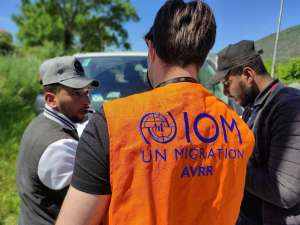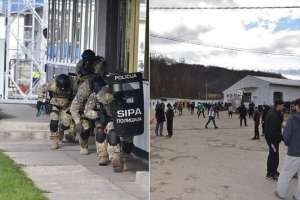SARAJEVO, May 15 (FENA) - The Council of Europe Commissioner for Human Rights Dunja Mijatović expressed her conviction that the BiH authorities would agree that the issue of migrants in Bosnia and Herzegovina should be resolved in accordance with human rights standards, although the increased number of asylum seekers and other migrants arrives is a social and economic challenge.
The Commissioner in her letter to the BiH Council of Ministers addressed the current migration situation in Bosnia and Herzegovina. The letter is quoted below in its entirety.
Whilst the increased arrivals of asylum seekers and other migrants may present social and economic challenges for Bosnia and Herzegovina, I am confident you would agree that they must be addressed in a human rights compliant way.
It is my understanding that, in recent months, Bosnia and Herzegovina has been facing increased arrivals. According to UNHCR 1138 refugees and migrants entered Bosnia and Herzegovina, at least 21 of whom were unaccompanied minors, and 253 requests for international protection were lodged with your authorities from January to 31 March 2018. Reportedly, most of these persons are currently located in Sarajevo, but there are at least 300 persons in Bihać and Velika Kladuša.
To date, only the asylum center in Delijaš, Trnovo, with an official capacity of 154 places, has been used to accommodate persons who have expressed their intention to seek asylum. According to the information available to me, the refugee reception center in Salakovac has not been put in use.
A number of migrants who recently arrived in Bosnia and Herzegovina have applied for international protection, as noted above, and their claims need to be assessed fairly and effectively.
In addition, Bosnia and Herzegovina’s obligations under human rights law are not limited to persons who have applied for such protection. For example, even when persons have not formally applied for asylum, any decision on their return must be taken in line with obligations arising out of the European Convention on Human Rights, including the prohibition of returns to a situation where an individual may be subjected to torture or inhuman or degrading treatment, and the prohibition of collective expulsion.
Moreover, I would like to recall that the European Committee of Social Rights has emphasized that the minimum guarantees under the European Social Charter, for the right to housing and emergency shelter apply to irregular migrants too. Shelter must be provided even when migrants have been requested to leave the country and even though they may not require long-term accommodation. The Committee has pointed out that the right to shelter is closely connected to the human dignity of every person, regardless of their residence status. It has also stressed that foreign nationals whether residing lawfully or not in the country, are entitled to urgent medical assistance and such basic social assistance as is necessary to cope with an immediate state of need (accommodation, food, emergency care and clothing).
In light of the above, I am concerned to learn that many refugees and migrants, including families with children, sleep rough on the streets, and have irregular access to food. This seems to be due to the lack of a systematic response by your authorities to the humanitarian needs of these persons. Access to primary health care has only been provided to the persons accommodated in the asylum center Delijaš. Persons living outside this center have had serious difficulties in accessing health care. There is no established systematic provision of secondary and tertiary health care. Due to these shortcomings, the specific needs of vulnerable groups, such as unaccompanied migrant children, LGBTI persons, families with children and single women with children, are difficult to identify and meet.
I have noted with profound appreciation the assistance provided to these refugees and migrants by civil society and charity organizations, international organizations and ordinary citizens who have worked hard to ensure that these people are provided with much needed accommodation, food, medical assistance, and legal aid. However, in my view, this situation cannot continue in this way.
Even though these organizations and individuals will continue to be involved in the work with refugees and migrants, the authorities need to take the responsibility and meet their obligations in an effective and systematic manner. As a matter of urgency, the authorities need to provide all refugees and migrants, including asylum seekers, with adequate accommodation using all available resources. This, in my view, would logically include the currently unused refugee reception center in Salakovac.
I would appreciate information about any steps taken in this regard. I have noted that in 2015 the Ministry of Security adopted a contingency plan related to migration (Plan hitnih mjera za osiguranje dodatnih kapaciteta, kontrolu i upravljanje prilivom masovnog broja migranata / izbjeglica u BiH) which appears to be based on the presumption that Bosnia and Herzegovina is a transit country, and not a destination country, and on a pattern of short-lasting migratory flows into the country at one specific entry point. However, the situation on the ground has changed since 2015.
There are increasing returns of refugees and migrants from Croatia to Bosnia and Herzegovina, due to which many refugees and migrants will eventually remain in Bosnia and Herzegovina. Additionally, the migration pattern has changed in a way that refugees and migrants are now mainly crossing into Bosnia and Herzegovina irregularly and in small groups.
I am of the opinion that these changes need to be reflected upon by your authorities and the contingency plan should be revised correspondingly, in order that the authorities are able to respond effectively and efficiently to the ongoing and future migration challenges.
In this context, I have noted with interest that on 26 April 2018 the Council of Ministers of Bosnia and Herzegovina adopted a conclusion according to which refugees and migrants who are currently in the country will be provided with assistance, and that work is ongoing with a view to finding new locations for their accommodation. I look forward to receiving information about your respective ministries’ plans aimed at the implementation of the above conclusion, as well as any intentions to revise the contingency plan.
Reports that I have received also indicate that many potential asylum seekers face obstacles in accessing the asylum procedure. The procedure entails that asylum seekers who are not accommodated in the asylum center must register an address with the Service for Foreigners’ Affairs, before the expiry of their temporary attestation, which is valid for 14 days, in order to obtain an appointment to submit their application with the Sector for Asylum. It appears that many persons who have been unable to register their address on time remain in Bosnia and Herzegovina irregularly and without access to asylum. I have been informed that last March the Service for Foreigners’ Affairs simplified the relevant procedure and it should now be easier for newly arriving migrants to regularize their status. I would appreciate receiving additional information in this regard.
I have taken note of your government’s intention to step up border controls to prevent further arrivals. I would like to stress that it is of the utmost importance that all persons who wish to seek international protection in Bosnia and Herzegovina have the possibility to do so. All asylum claims need to be considered on their own merits in fair and efficient asylum procedures taking into account individual circumstances and up-to-date and relevant country of origin information. While waiting for their claims to be processed, asylum seekers need to have access to support and services which would provide them with a possibility to live in dignity.
Furthermore, as noted above, any decisions taken with regards to persons stopped at the border who do not formally apply for asylum must still be taken on an individual basis, taking into account Bosnia and Herzegovina’s international obligations. I would be interested to receive information about the safeguards in place to ensure such obligations are fully respected in the implementation of border controls.
(FENA) S. R.











